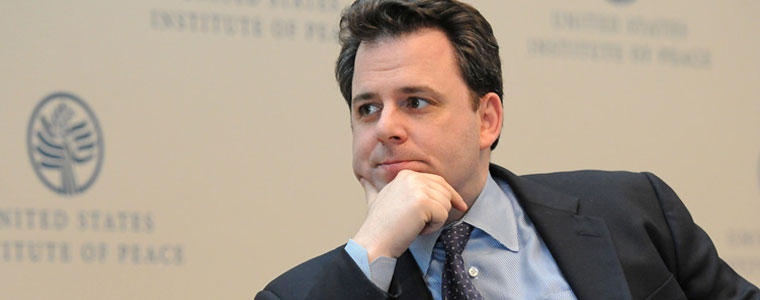Promoting U.S. Global Interests through International Peacekeeping
On February 27 USIP hosted Assistant Secretary of State for Political-Military Affairs Andrew Shapiro for a public event. Mr. Shapiro discussed U.S. programs to build global peacekeeping capacity, and the way these efforts help advance U.S. national security.
Read the event coverage, State’s Shapiro, at USIP, Outlines U.S. Policy on Peacekeeping

With more than 100 active conflicts around the world, international peacekeeping operations play a central role in reducing violence and ensuring stability. As the number of peacekeeping operations grows, together with the size of their mandates, so does the importance of U.S. involvement in this critical conflict management tool. But how central should multilateral peacekeeping be to U.S. foreign policy in times of fiscal austerity?
With a key role in U.S. national security, the U.S. Institute of Peace (USIP) bolsters peacekeeping missions worldwide through its on-the-ground training programs and by training local populations to resolve conflicts themselves before they turn deadly. To discuss U.S. support for international peacekeeping operations, USIP hosted Assistant Secretary of State for Poltical-Military Affairs Andrew Shapiro for a public event on February 27. Mr. Shapiro discussed U.S. programs to build global peacekeeping capacity, and the way these efforts help advance U.S. national security.
A full version of Mr. Shapiro's speech is available online.
Featuring
- Mr. Andrew Shapiro
Assistant Secretary of State for Political-Military Affairs - Ms. Tara Sonenshine, Introductory Remarks
Executive Vice President, U.S. Institute of Peace - Dr. Abiodun Williams, Moderator
Senior Vice President, Center for Conflict Management, U.S. Institute of Peace
Explore Further
- Multilateral Political Missions and Preventive Diplomacy
USIP Special Report by Richard Gowan | December 2011 - Brimmer Rejects Criticisms of U.N. at USIP Event
News Feature | September 9, 2011 - Senior Official to Discuss U.N. Policies at USIP
News Feature | September 1, 2011 - Learn about USIP's United States-United Nations Forum
- USIP Task Force on the United Nations
Report | June 2005



